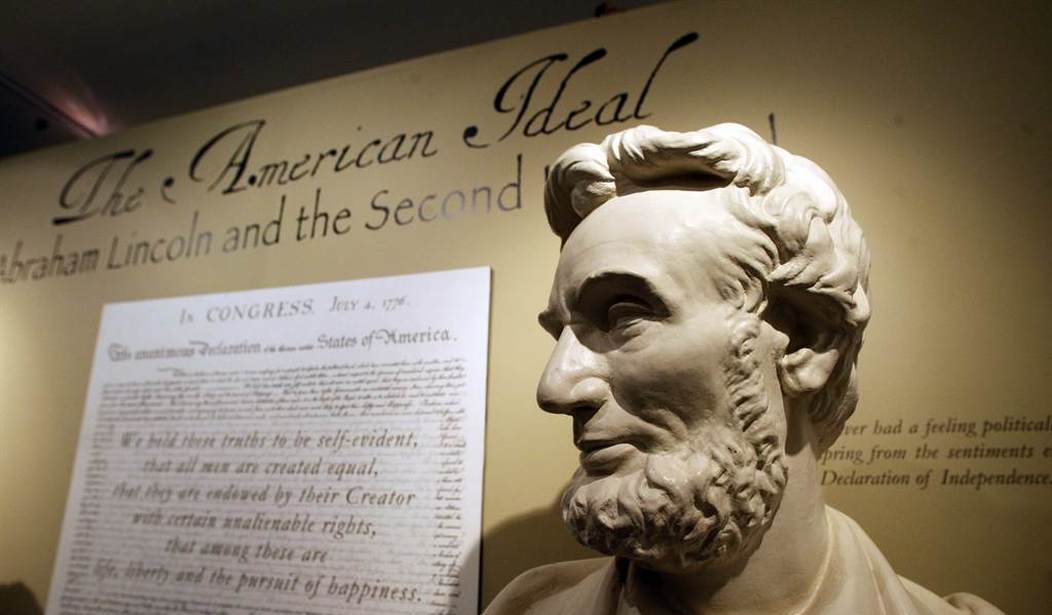An Italian exchange student once asked me what he should know in order to understand America. The best I could come up with on the spot was the U.S. Constitution, jazz and baseball.
Later it would come to me that to study each of those only in the abstract, as just a rule book or a series of notes on a page, would be less than useful to someone trying to understand America. The notes would be there, but not the music. The rules of the game would be there, but not the spirit. That spirit cannot be appreciated apart from the history that gave rise to it, and which it shapes in return.
What was the country's spirit like as Abraham Lincoln delivered his second Inaugural Address as president of the United States on Saturday, March 4, 1865? What must it have been like to be there that day? Picture it:
The new vice-president would celebrate his swearing-in by delivering a drunken rant about his modest beginnings and little else. All around the capital lay the evidence of a great civil war that had consumed almost four long years, and left the land covered in blood and ruin, widows and orphans and graves ... and was only then grinding to an uncertain close.
That was the dispiriting scene as the once and future president rose to address those assembled there, and a shattered nation.
Even now, and certainly then, learned scholars would debate the question of what had caused The War. As if standing on the heights of history, Mr. Lincoln would come as close as anyone ever has to answering that question. And his would not be the partisan answer one might have expected from the leader of one side on the cusp of victory in a terrible war:
"Both parties deprecated war; but one of them would make war rather than let the nation survive; and the other would accept war rather than let it perish. And the war came."
Recommended
And the war came. Like an awesome act of justice from on high, as if to expiate the terrible sin of centuries of slavery: "These slaves constituted a peculiar and powerful interest. All knew that this interest was somehow the cause of the war. ... Neither party expected for the war the magnitude or the duration which it has already attained. ... The prayers of both could not be answered; that of neither has been answered fully. The Almighty has His own purposes."
The Almighty has His own purposes.
There is something biblical in those words. The victor would assign no blame that all did not share. If he had been unyielding in war, Abraham Lincoln would be more than magnanimous in victory. He would be humble, as his nation, North and South, had been humbled.
The Almighty has His own purposes.
Yet man must do what he can, without thought of vengeance or vainglory. "With malice toward none, with charity for all, with firmness in the right as God gives us to see the right, let us strive on to finish the work we are in...."
Abraham Lincoln understood that the crisis he faced was too great for smallness on his part, or on his country's. He would look beyond victory and defeat, beyond grief and vengeance, toward understanding, forgiveness, healing, hope. Toward a renewed and ever-new Union.
The continuing and defining American challenge, said Tocqueville in his still unmatched study of "Democracy in America," is to find the right balance between liberty and equality.
In his Second Inaugural, Abraham Lincoln did not choose one or the other, or even portray them as opposing forces. He presented liberty and equality as one, each bracing the other, like the timbers of a great ship, as inseparable as the Union itself. Or in Daniel Webster's words, Liberty and Union, Now and Forever, One and Inseparable.
The good ship Union would sail on long after its captain had departed, and it still heads, as always, in the direction of freedom -- and not freedom for just this nation. For such a vessel cannot but help roil the waters all around, sending out ripples who knows how far, lifting the hopes of others just at the sight of its tall masts, its billowing sails, as it proceeds on its own undeterrable course. Despite the debris and wreckage in its wake, despite all the fears and animosities within and without, despite headwinds and gusts that send it off course, mutinies and failures of will, seizures of trepidation and indecision, it sails on, its flag still there. Undeterrable.
I now realize that, when my young Italian friend asked for the key to understanding America, I should have just handed him a copy of Lincoln's Second Inaugural, and said: "Here it is. Now go and study."

























Join the conversation as a VIP Member